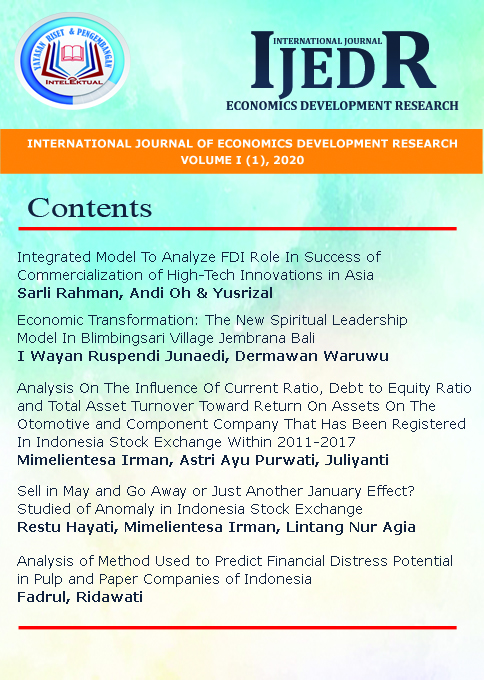Economic Transformation: The New Spiritual Leadership Model In Blimbingsari Village Jembrana Bali
DOI:
https://doi.org/10.37385/ijedr.v1i1.23Keywords:
Leadership, Spiritual Leader, Transformation of Village Economics, BaliAbstract
A spiritual leader can appear in any situation. It can not be just a genetic theory that allows a person to be a spiritual leader but is supported by social theory and ecological theory. In addition to the above theory, there is one more the most fundamental theory of the emergence of a spiritual leader of Divine theory.
The aim of this study is to identify the meaning of spiritual leadership in Blimbingsari Village, to identify the principle of spiritual leadership in Blimbingsari Village, and to analyze what does the spiritual Leader do to the economic transformation of Blimbingsari village.
The methodology used is qualitative with data collection techniques are participant observation or participatory nature of direct involvement, interview, literature review, case study, and documentation.
Village leaders Blimbingsari always increase leadership capacity through the intervention of the factors of spiritual values, work ethics, social capital, and entrepreneurial factors. These factors are growing in the middle of the village of Blimbingsari understood as a pattern of beliefs, values, and behaviors and leaders as agents of change do the role and relationship with the community intensive because it is influenced by historical trends, social attitudes, and socioeconomic factors.
References
Adler, P, & Kwon, S., (2000). “Social Capital: The good, The bad and The ugly. In E. Lesser (Ed). Knowledge and Social Capital: Foundations and Applications”. Butterworth-Heinemann.
Barker, Cris. (2005). Cultural Studies teori praktik. Yogyakarta : PT. Bentang Pustaka.
Basrowi & Suwandi. 2008.”Memahami Penelitian Kualitatif”. Rineka Cipta. Jakarta.
Bourdieu, P. (1986). “The forms of capital. In J. Richardson (Ed). Handbook of Theory and Research for Sociology of Education (pp. 241-258)”. New York: Greenwood Press
Bass B.M. dan Avolio, B.J. (1993). Transformational Leadership dan Organizational Culture. Public Administration Quarterly, 17(1)
Castells Manuel. (2002). “The Power of Identity”, United Kingdom. Blackwell Publishing.
Coleman James S. 2008. “Dasar-dasar Teori Sosial”. Bandung. Penerbit Nusa Media
Drucker Peter. (1967). “The Effective Executive”. Harper & Row, Publisher, New York, Evanston, and London.
Dubrin, J. Andrew. (2007). Leadership, Research Finding, Practice, and Skills. Boston: Houghton Mifflin Company.
Darcy T. dan Kleiner, B.H. (1991). Leadership for Change in a Turbulent Environment. Leadership and Organization Development Journal.
Escobar, Arturo ((ed) (1995). “Encountering Development : The Making and Unmaking of The Thir World”. Princeton Studies in Cultural/Power/History. Princeton Economic and The Space of Development : Tales of Growth and Capital.
French, Wendell L., at.al. (ed.) (2000). Organization Development and Transformation: Managing Effective Change, Irwin McGrall-Hill Singapore.
Fisher D.C. (1980). On the Dubious Wisdom of Expecting Job Satisfaction to Correlate with Performance. Academy of Management Review, 5: 607-612.
Francis Fukuyama (1999), “Social Capital And Cicil Society”. George Mason University, The Institute Of Public Policy.
French, Wendell L et al, (ed.) 2000. Organization Development and Transformation, Irwin McGrall-Hill Singapore.
Grillo, R.D. and R.L. Stirrat. 1997. “Discourse of Development : Anthropological Perspectives” Berg, Oxford. Discourses of Development : The Viev from Anthropology (pp 1-34).
Khalili. S. (1994) Leadership Style and their Applications in the Iranian Management System. (Tehran: Iran, 1994)
Kottler, John P. (1996). Leading To Change, Harvard Business School Press.
Michel Picard, 2006. Bali. Pariwisata Budaya dan Budaya Pariwisata. Yakarta, KPG (Kepustakaan Popular Gramedia).
Marshall, Catherine & Gretchen B Rossman. (1989). “Designing Qualitative Research” Newbury Park, London, New Delhi: Sage Publications.
Morse, Richardo S, Terry F. Buss and C Morgan Kinghorn. (2007). Transforming Public Leadership for the 21st Century, M.E. Sharpe, Armonk New York.
Robbins, SP & Judge, TA. (2007). Organization Behavior, Pearson International. New Jersey : Upper Saddle River.
Schumpeter Joseph. (1969). “The Theory Of Economic Development”. An Inquiry into Profit, Capital, Credit, Interest, and the Business Cycle. Oxford University Press, London Oxford New York.
Suartika, Gusti Ayu Made. (2005). “Vanishing Paradise, Planning and Conflict in Bali”. Thesis from Faculty of The Built Environment, University of New South Wales. New South Wales, Australia.
Suyaga Ayub, Ketut. (2004). “From Unwanted to Living Church”.Based on interview taken by Lenny Van Ameijde. Gereja Kristen Protestan di Bali. Penerbit GKPB. Bali
Stoner, James A.F dan R. Edward Freeman. (1989). Management, Prentice-Hall of India.
Todaro, Michael P. (2000). Economic Development: Economics, Institutions, and Development: a Global Perspective
Wijaya Nyoman. (2003). “Serat Salib Dalam Lintas Bali”. Menapak jejak Pengalaman Keluarga GKPB 1931-2001. CV. Krinon. Yayasam Samaritan, Denpasar.





